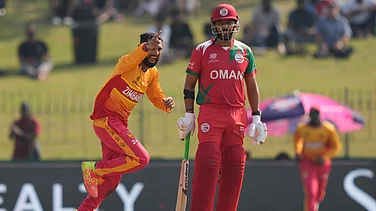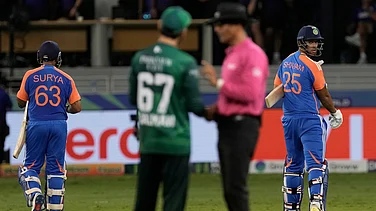A year after the ’87 World Cup, I visited Pakistan for a social science conference. Here, a lady psychoanalyst from Lahore presented a paper on ‘the Great Man Syndrome’. Borrowing from the work of Carl Gustav Jung, and adding a feminist angle of her own, she argued that the South Asian male had fantasies of omnipotence. The dreams were, by definition, unrealisable, but in trying to live them out, these men brought down the societies they were fortunate enough to lead. Paradigmatic cases were Zia-ul-Haq’s attempt to Islamicise Pakistan, and Rajiv Gandhi’s dispatch of Indian troops to Sri Lanka. There was also Imran Khan. Thus, when the ’87 World Cup came along, the once great Khan was old and out of form, yet his Jungian fantasies made him usurp the Pakistani captaincy. Now, implied the lady, if only he had allowed Miandad to lead, would Pakistan have been booted out in the semi-final?
Also at the conference was a distinguished Indian psychoanalyst, whom I won’t name for fear of libel. He said, off the record, that a reading of Freud made it plain that the Lahori lady had once been in love with Imran. I have myself often wondered where the Jungian psychoanalyst was when Imran played, captained, and won the ’92 World Cup.
THE KIWIS AREN’T BIRD-BRAINED
In ’92, as in ’75, ’79 and ’83, the home sides started well but eventually faded away. Australia did not qualify for the semi-final. New Zealand did, but saw the match taken from them by an innings of breathtaking brilliance by the then unknown Inzamam-ul Haq (it was this innings that led Imran Khan to make the incautious claim that the Multani would become a better batsman than Sachin Tendulkar). Now the Kiwis are generally regarded as earnest and well-meaning men but altogether dreary and dull as cricketers. But in this tournament, they were responsible for two daringly effective innovations. First, ‘pinch hitter’ at the beginning of the innings. This was the left-hander Mark Greatbatch, who without so much as a sighter would begin tonking the ball all over the park. Second, an off-spinner opening the bowling. This was Dipak Patel, whose slow looping deliveries befooled opponents accustomed to playing seam and bounce.
These two tactics are now widely used, not least by the team New Zealand eventually lost to in ’92. When Shahid Afridi hits straight six in the first over, or Saqlain Mushtaq comes on to bowl early, I think that Martin Crowe, in the commentator’s box, must allow himself a wry smile.
IT RAINED RUNS
CRICKETING-WISE, the Indian perf o rmance I remember best f rom the ’92 Cup was Azhar’s knock against Australia. The rules grievously discriminated against the team batting last, especially if it rained. In this match, India needed about 5.5 runs an over to start with, it rising to 9 an over when a shower stopped play. Azhar hit a series of unbelievable shots, drives over extra-cover and flicks through a packed on-side field. He scored 93 at more than a run a ball. After he was out, India needed 12 off the last over. More struck two fours, both fine leg glances, then was bowled. Four were needed off the final ball, with Srinath on strike. The young fast bowler went for the big one, connected and stayed put at his crease, confident it would clear the fence. But there was a stiff breeze into which he had hit the ball, which kept it in the air a little longer, and allowed it to drop inside the fence.While the ball hung in the air, Srinath realised he might have to run the runs. He ran two, but was run out inches before he had completed what would have been the tying run. It was sheer inexperience— today, Srinath would be off running as soon as he’d hit the ball.
MOM-IN-LAW’S A BETTER BAT
THE ’92 final was contested between England and Pakistan. The last time the two sides had met on the cricket field, there had been a dddhuge ro w, sparked by an abusive exchange between an English captain and a Pakistani umpire. Among the immediate responses to that exchange, I remember two— Tom Graveney’s magisterially precise claim that ‘they [the Pakis] have been cheating us [the honest British] for 38 years’, and Botham’s impulsively off-hand remark that ‘Pakistan is a place to which I would not even send my mother- in - law ’ .
Well, here was Botham, opening the innings under lights in Melbourne, with cricket’s most tre as ured prize at stake. Very early in the match, the great all-rounder flash e d at a ball outside off and was given out caught behind. As he walked off the ground ,shaking his head, Amir Sohail ran up to him and remarked, ‘Send your mother- in - law — at least she will bat better than you’. The truth is that Botham did not touch the ball. But then the umpire was not a Pakistani.






















